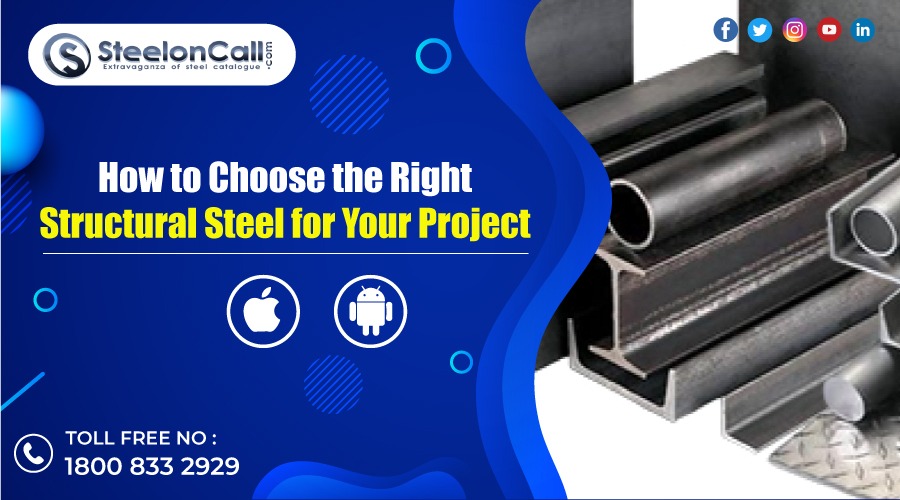How To Choose The Right Structural Steel For Your Project

Selecting the ideal structural steel material is an integral component of successful project construction, as it will impact its integrity, durability, and cost-effectiveness. Structural steel is a versatile and widely utilized material across various industries from construction to manufacturing. When making an informed choice it is crucial to take several factors into consideration such as type of project, load bearing requirements, environmental conditions and budget constraints into account. Here is an article dedicated to helping you select appropriate structural steel for your specific endeavor.
1. Understanding Types of Structural Steel:
Structural steel can come in various types, each offering specific properties and applications. Common types include:
-
Carbon Steel: Carbon steel is one of the most popular structural steel types due to its strength and affordability, making it suitable for numerous projects such as buildings, bridges, and pipelines.
-
High-Strength Low-Alloy Steel (HSLA): HSLA steel contains small amounts of alloying elements like copper, nickel or phosphorus to increase strength and corrosion resistance, making it suitable for projects requiring components with increased strength.
-
Stainless Steel: Stainless steel is widely recognized for its corrosion-resistance and long-term use, such as marine structures or chemical processing plants. Due to these qualities, it often makes an ideal material choice in such projects.
-
Weathering Steel: Also known as Corten steel, weathering steel develops an impregnable protective rust layer over time that acts as an effective shield against corrosion. Usually found in outdoor structures like bridges and sculptures.
2. Consider Your Project Types:
Your project type will play a pivotal role in selecting steel materials. For instance:
-
Building Construction: Carbon steel is often chosen for its strength and cost effectiveness in building projects, while stainless steel may be preferred when operating in environments with higher humidity or salt exposure.
-
Bridge Construction: Bridges require high-strength steel to withstand heavy loads and adverse weather conditions, and often utilize weathering steel such as HSLA steel in their construction.
-
Industrial Facilities: When selecting materials for an industrial facility, their selection may depend on its manufacturing requirements. Stainless steel is often chosen due to its corrosion-resistance. Food and chemical industries commonly employ it.
3. Evaluate Load-Bearing Requirements:
Understanding the load-bearing requirements for your project is of utmost importance. You will need to determine the maximum loads your structural steel must support - both dead loads (permanent) and live loads (temporary). When selecting steel for this use, make sure it has both strength and stiffness to meet these demands while ensuring safety.
4. Environmental Considerations:
Environmental conditions play a pivotal role in selecting an ideal structural steel product. Consider these factors when making your selection:
-
Corrosion Resistance: For projects in coastal environments or exposed to chemicals, stainless steel or weathering steel may provide essential corrosion protection.
-
Temperature Extremes: Excessive temperatures can have an adverse impact on steel's mechanical properties, so when deciding between various steel types for use during anticipated temperature variations it's essential to choose one which can withstand these variations and maintain its properties.
-
Exposure to Moisture: Areas with high humidity or frequent rain may necessitate corrosion-resistant steel structures that have protective coatings applied, in order to increase their lifespan and extend their useful life span.
5. Budget Considerations:
A realistic consideration in most projects is budget constraints. High-strength or corrosion-resistant steel offers advantages but at a higher price; in order to find an appropriate balance between its performance and your budgetary limitations.
6. Consultation with Structural Engineers:
If in doubt, consult with structural engineers or experts who can offer valuable insight into which steel type will best meet the requirements and conditions of your project. They will conduct structural analyses before suggesting which steel type best meets these parameters.
7. Real World Applications:
In order to better illustrate how choosing structural steel impacts real-world projects, let's look at a few examples:
-
Skyscraper Construction: When it comes to skyscraper construction projects that demand maximum structural integrity, carbon steel is usually the material of choice. Thanks to its ability to support immense vertical and lateral loads, carbon steel makes an excellent choice for these endeavors.
-
Bridge Rehabilitation: When renovating aged bridges, engineers often rely on weathering steel's corrosion-resistance as part of the rehabilitation plan to extend its lifespan without compromising its safety or aesthetic appeal. This allows engineers to ensure maximum lifespan without compromising either aesthetics or safety.
-
Chemical Processing Plants: Chemical processing plants often feature stainless steel for its corrosion-resistance. This helps preserve structural integrity as well as worker safety within these facilities.
Conclusion:
Selecting the ideal structural steel material for your project requires careful consideration of factors like project type, load-bearing requirements, environmental conditions, budget constraints and expert consultation. By making an informed choice you can help ensure that your project complies with safety standards, meets its performance objectives, remains within its budget and remains compliant.

